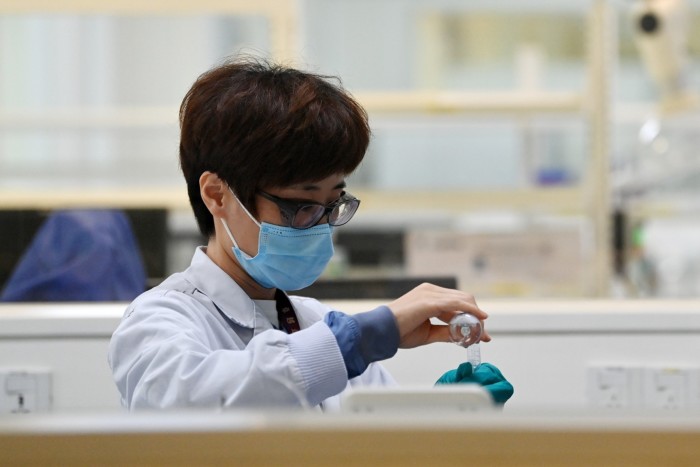Pictures of health: the winners of Britain’s Healthiest Workplace

Roula Khalaf, Editor of the FT, selects her favourite stories in this weekly newsletter.
Britain’s Healthiest Workplace, run by Vitality in partnership with Aon, Rand Europe, the University of Cambridge and the Financial Times, is designed to track the health and productivity of employees and identify the best employers in the private and public sectors.
After a two-year pause during the pandemic, data collection reopened in 2022 and has drawn on the responses of more than 8,500 employees from 65 organisations. Employers answer questions on their leadership and culture, and the provision and use of workplace wellness interventions, facilities and services. Employees submit answers on productivity, job satisfaction and risk factors such as smoking.
The data provide a way to track the health of the British workforce overall and identify recent trends. They also make it possible to identify the healthiest workplaces, which this year have been segmented to produce three top performers in each of three categories split by employer size: small (20-249 staff); medium (up to 999); and large (more than 1,000).
This year’s winners include some that have performed well consistently in recent years, but also new entrants. Their activities range from financial services and energy to consulting.
Britain’s Healthiest Workplace: award winners
Small organisations (20-249 staff)
1st OpenCredo
2nd Blue Motor Finance
3rd Phoenix Natural Gas
Mid-sized organisations (250-999 staff)
1st Novo Nordisk
2nd Program Planning Professionals (trading as MI-GSO | PCUBED)
3rd CLS Group
Large organisations (1000+ staff)
1st Nomura
2nd Arqiva
3rd Derbyshire Community Health Services NHS Trust
Stress-busting success

A healthy working environment is one where you can bring “your whole self to work”, say staff at MI-GSO | PCUBED. The global project management consultancy, a winner in the Vitality awards, runs initiatives to promote workplace wellness, including mentoring schemes, book clubs, and physical challenges — such as half marathons and the five peaks challenge.
“We’re conscious that we’re not pilots or air traffic controllers or doctors, but we work in quite a high-intensity career and a lot is expected in terms of delivery — for our clients, in our business, as well as things like . . . travel and potentially being away from home,” says Laura Wilson, a consultant at the company. “We’re aware it is quite a stressful career and we’ve [brought in] improvements based on that.”
The company’s flagship wellbeing initiative is what it calls “communities of practice”, where employees come together monthly to discuss or launch new wellness measures. About half of the business has undergone external mental health first aid training. The company also runs “affinity groups” in which female, LGBT+ and disabled staff can talk, and assigns an internal coach to each new staff member.
“It’s not one-size-fits-all,” says Julia Bellak, human resources manager. “We need to be sensitive to the fact that individuals’ wellbeing doesn’t always follow trends.”
Like other global businesses, the company is adjusting to the new norms of hybrid work, which, says Wilson, have made for a better work-life balance. She says the days when staff would leave on a Monday to work away from home and return on a Friday have “largely disappeared”.
Making wellbeing a priority

Derbyshire Community Health Services NHS trust has performed well in healthiest workplace awards despite the funding challenges of operating in the public sector.
Unlike private companies, an NHS organisation is limited in what it can offer staff, because of funding constraints, but the trust has “made staff wellbeing a key priority”, says Deborah Creaser, its wellbeing lead.
“One of the challenges of being part of the NHS is that, in comparison to independent and private businesses, we don’t have a vast pocket of money to spend,” she adds. “However, we have the expertise of our clinical colleagues. It’s about tailoring it for the people and needs of our workforce.”
The trust’s wellbeing team organises ‘Schwartz Rounds’, in which staff discuss experiences at work and how they affected them emotionally. The trust also has a partnership with a counselling service, and has an employee assistance programme for issues ranging from bereavement to reproductive health.
Creaser emphasises the importance of anticipating what might lie ahead for employees. “Very early on in 2022, our human resources directors and board and executive staff raised the implications of the cost of living crisis — way before it was on everyday media,” she says.
“We’re offering a hardship fund for staff, for people who are really suffering, which is up to £500 per staff member.” The trust is also reimbursing the cost of Blue Light Cards, which offer discounts at high street businesses.
Promoting staff wellbeing is crucial for providing NHS services, says Creaser. “Everything is impacted . . . if we can’t retain staff or if they’re unwell, then we can’t run services.”
Fair treatment for staff out of sight but not out of mind

Software development consultancy OpenCredo tries to provide consistent working hours and terms for staff deployed at clients’ offices.
“Whenever we engage with a client, we find out what their policies are, because we may need to align with them,” explains the company’s chief executive, Nicki Watt. “Sometimes, if there’s no alignment, we may not work with them.”
Working hours and expectations are agreed between OpenCredo and its clients in advance, with staff involved in discussions around terms and conditions.
OpenCredo offers a wellbeing package comprising common tech company fare — free snacks and massages, as well as private health insurance — while also promising to give staff opportunities to engage meaningfully with clients, rather than moving frequently between projects.
Operations head Donna Burgess says OpenCredo seeks to promote diversity by providing mentoring, training and frequent pay reviews, so staff gain skills in a company that demands “excellence over mediocrity”.
This year, the company underwent a “fair treatment audit” — pooling pay data gathered from open sources and employee surveys, and using this information to address discrepancies in a few cases.
While women, on average, earn six percentage points less than men at the company, Burgess says there is no gender pay gap when adjusting for types of role and market rates.
Watt adds that half of the company’s board and two-thirds of its leadership team are female, and that a diverse team is attractive for new recruits, who see themselves represented at the highest levels of the organisation.

Comments